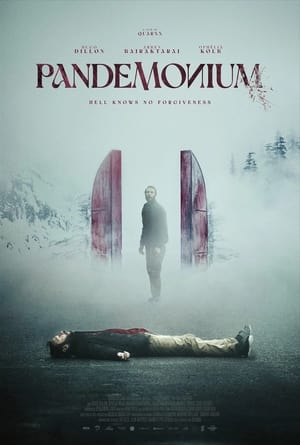Pandemonium (2024) Movie Review: A Dark Dive Into Eternal Damnation
The French film Pandemonium (2024) is a bold and visually arresting exploration of morality, sin, and the afterlife, directed and written by Quarxx. This cinematic descent into hell attempts to grapple with heavy philosophical and emotional themes, juxtaposed with striking visual elements. However, while the film’s ambition is admirable, it often stumbles in execution, leaving viewers with mixed emotions.
A Premise Rooted in Existential Dread
The story begins with Nathan (Hugo Dillon) and Daniel (Arben Bajraktaraj) waking up at the scene of a car crash. Initially confused, they soon realize they have both died. Nathan’s journey begins with his confrontation of past sins, which dictates his fate in the afterlife. Guided by the enigmatic Daniel and the sinister demon Norgül, Nathan descends into the depths of hell. Along the way, he encounters other tormented souls, including a psychopathic young girl, Nina, and a grieving mother, Julia. These encounters force Nathan to confront the nature of guilt, punishment, and redemption.
Aesthetic Brilliance Meets Narrative Disarray
One of the film’s strongest aspects is its breathtaking cinematography. The opening sequence—set on a snow-covered mountain road—creates an eerie, ethereal atmosphere that perfectly captures the tension of Nathan and Daniel’s existential predicament. The visual language is rich with Gothic elements, enhancing the unsettling tone of the narrative.
However, Pandemonium falters as it transitions into an anthology-like structure. The stories of Nina and Julia, while intriguing in concept, feel disjointed and fail to coalesce into a cohesive narrative. The lack of clear connections between these vignettes undermines the film’s overarching themes of judgment and morality.
Exploring Moral Complexity
The film delves into controversial moral questions, such as whether suicide and euthanasia constitute sins deserving eternal punishment. Nathan’s character arc, as well as the stories of Nina and Julia, raise valid critiques of traditional depictions of hell and divine justice. However, these explorations often feel surface-level and lack the depth required to leave a lasting impact.
For instance, Julia’s story, which involves her struggles after her daughter’s suicide, touches on societal issues like bullying and mental health. Yet, the narrative’s heavy-handed approach and gratuitous depiction of suffering detract from its emotional resonance. Similarly, Nina’s tale—with its darkly comedic yet grotesque portrayal of a child’s psychopathy—fails to fully explore the implications of her actions.
Performances and Direction
Hugo Dillon and Arben Bajraktaraj deliver compelling performances, particularly in the opening scenes. Their chemistry and emotional depth ground the film’s metaphysical musings. Dillon’s portrayal of Nathan’s growing desperation is particularly striking, while Bajraktaraj brings a stoic yet haunting presence to Daniel.
Quarxx’s direction shines in moments of surreal horror and dark humor. However, his tendency to prioritize visual spectacle over narrative coherence ultimately hampers the film. The inconsistent pacing and tonal shifts make it difficult for viewers to stay engaged.
Streaming Availability
For audiences interested in watching Pandemonium online, the film is available for streaming on several platforms in the United States, including:
- Amazon Prime Video
- Apple TV
- Microsoft Store
- Google Play Movies
These platforms offer rental and purchase options, allowing viewers to choose how they experience this visually stunning yet narratively flawed film.
Conclusion: A Flawed Vision of Hell
Pandemonium (2024) is a visually mesmerizing but thematically uneven film. While its exploration of guilt, punishment, and redemption offers moments of profound insight, the disjointed storytelling and over-reliance on shock value ultimately undermine its potential. For those who appreciate avant-garde cinema and philosophical musings, this film is worth a watch. However, viewers seeking a tightly woven narrative may find themselves disappointed.
















